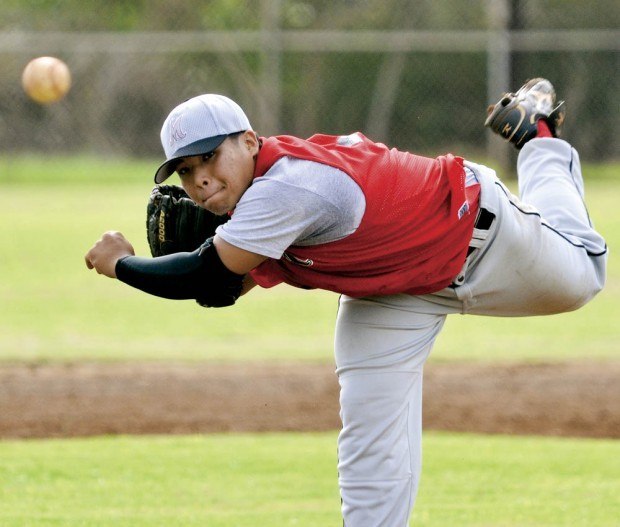LIHU‘E — There were challenges in the 82 years the Americans of Japanese Ancestry baseball league has been in existence, Kaua‘i Mayor Bernard Carvalho Jr. told the crowd Sunday. But with the exception of five years when World War II
LIHU‘E — There were challenges in the 82 years the Americans of Japanese Ancestry baseball league has been in existence, Kaua‘i Mayor Bernard Carvalho Jr. told the crowd Sunday.
But with the exception of five years when World War II broke out in 1942 through 1947, the Hawai‘i State AJA Baseball Association has crowned a state champion who emerges from the representatives of the different leagues in the association, states AJA’s website.
Kaua‘i’s AJA League is one of the state’s representatives, and Carvalho thanked the league’s leaders and volunteers for perpetuating one of the cultures that is part of the diversity of Kaua‘i.
“Kaua‘i is such a special place because of its cultural diversity,” Carvalho said. “Uncles all talk about playing baseball and after the game, coming together to enjoy what is in the coolers and the foods that span the different cultures. That is when the people come together and represent the island as one.”
In addition to addressing the teams and baseball fans, he took his turn in rendering the national anthem, eliminating any possibility of “technical difficulties.”
The Hawai‘i State AJA website states that each island’s league is run entirely by volunteers dedicated to perpetuate the century-old AJA baseball legacy passed on to them by men before them.
Tom Shigemoto, whom the mayor described as one of the 82-year-olds involved in baseball, is the president of the Kaua‘i AJA league.
“I want to make a correction,” Shigemoto said. “I’m not 82 years old, and the success of AJA baseball is attributed to our predecessors.”
Shigemoto said in addition to the league leaders that include Brian Yamase, Mamo Kaneshiro, Earl Miyao, Russell Maeda and Gerald Ako, there are the coaches and managers who need thanks because the people who play in the league are the hardest people to coach.
Umpires and field officials are also greatly appreciated, Shigemoto said.
“These umpires are not here for the big bucks,” he said. “We appreciate them because without them, there would be no game.”
The league is dedicated to past Americans with Japanese ancestry who sacrificed in the face of prejudice, discrimination and unimaginable adversity so that others could have the opportunities people now take for granted, according to the AJA website.
Rev. Kojun Hashimoto of the West Kaua‘i Hongwanji, in offering the invocation for the 2011 season, said, “Baseball is a great sport, providing opportunities for all our young sons.”
There is giri, or duty and obligation, to honor the values of Japanese heritage and perpetuate that culture by continuing the legacy and tradition of AJA baseball, handed down from their fathers and their fathers before them, the Hawai‘i AJA website states.
This giri for those volunteers and those who will follow, and of the AJA ballplayers who play now, in the future and the past, makes this league different from any league.
“We have teams from all parts of the island,” Carvalho said. “You all make an impact in one way or another. We will continue to support this aspect of our culture.”
During the protocol of opening day, Shigemoto presented the 2010 championship trophy to the Hanapepe Rivermen who also had one of its players, Vince Nitta, being announced as the most valuable player.
Ako said there are six teams making up the Kaua‘i AJA Baseball League.
These include the Hanapepe Rivermen, the Kalaheo Farmers, the Makaweli Indians, the Kapa‘a Homesteaders, the Lihu‘e Townies, and the Waimea Tsunami.
During the season, there will be three games being played on Sundays at Vidinha and Hanapepe stadiums.
Kapa‘a survived a rapidly declining performance from its closer, allowing three runs by Makaweli before time ran out on its 10-6 season-opener.
Results from the second and third games should be forthcoming. Those games featured the Kalaheo Farmers battling the Lihue Townies in Game 2, and the Waimea Tsunami meeting the defending champion Rivermen in Game 3.
Next Sunday’s game will have Kapa‘a meeting Lihu‘e starting at 10 a.m. in a Vidinha Stadium double-header. That game will be followed by Makaweli going up against Hanapepe starting at 1 p.m. Kalaheo will take on Waimea in a single game at Hanapepe Stadium starting at 11 a.m.
Visit ajabaseball.com for more information.
• Dennis Fujimoto, photographer and staff writer, can be reached at 245-3681 (ext. 253) or dfujimoto@kauaipubco.com.




